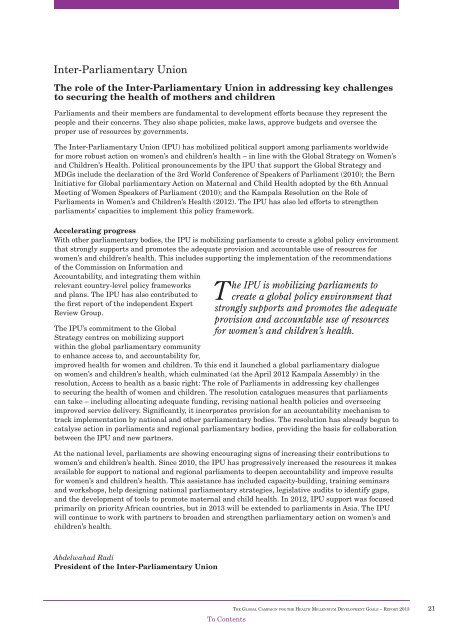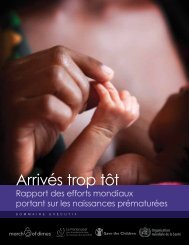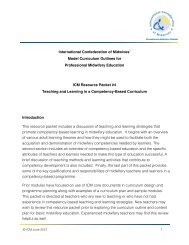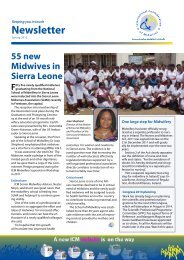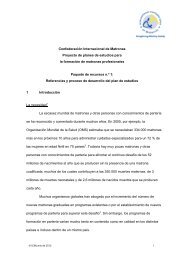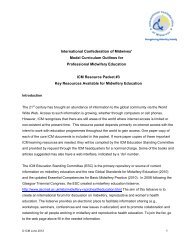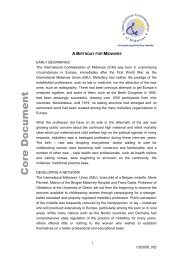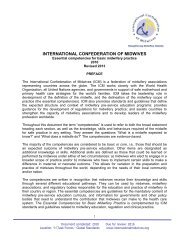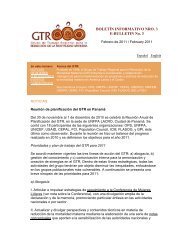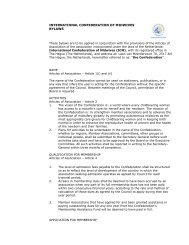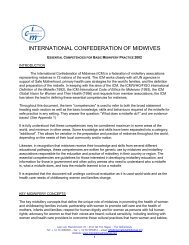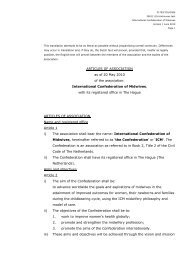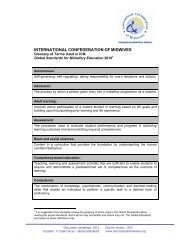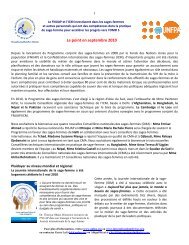Download the pdf of the report pdf, 2.78Mb - World Health ...
Download the pdf of the report pdf, 2.78Mb - World Health ...
Download the pdf of the report pdf, 2.78Mb - World Health ...
Create successful ePaper yourself
Turn your PDF publications into a flip-book with our unique Google optimized e-Paper software.
Inter-Parliamentary UnionThe role <strong>of</strong> <strong>the</strong> Inter-Parliamentary Union in addressing key challengesto securing <strong>the</strong> health <strong>of</strong> mo<strong>the</strong>rs and childrenParliaments and <strong>the</strong>ir members are fundamental to development efforts because <strong>the</strong>y represent <strong>the</strong>people and <strong>the</strong>ir concerns. They also shape policies, make laws, approve budgets and oversee <strong>the</strong>proper use <strong>of</strong> resources by governments.The Inter-Parliamentary Union (IPU) has mobilized political support among parliaments worldwidefor more robust action on women’s and children’s health – in line with <strong>the</strong> Global Strategy on Women’sand Children’s <strong>Health</strong>. Political pronouncements by <strong>the</strong> IPU that support <strong>the</strong> Global Strategy andMDGs include <strong>the</strong> declaration <strong>of</strong> <strong>the</strong> 3rd <strong>World</strong> Conference <strong>of</strong> Speakers <strong>of</strong> Parliament (2010); <strong>the</strong> BernInitiative for Global parliamentary Action on Maternal and Child <strong>Health</strong> adopted by <strong>the</strong> 6th AnnualMeeting <strong>of</strong> Women Speakers <strong>of</strong> Parliament (2010); and <strong>the</strong> Kampala Resolution on <strong>the</strong> Role <strong>of</strong>Parliaments in Women’s and Children’s <strong>Health</strong> (2012). The IPU has also led efforts to streng<strong>the</strong>nparliaments’ capacities to implement this policy framework.Accelerating progressWith o<strong>the</strong>r parliamentary bodies, <strong>the</strong> IPU is mobilizing parliaments to create a global policy environmentthat strongly supports and promotes <strong>the</strong> adequate provision and accountable use <strong>of</strong> resources forwomen’s and children’s health. This includes supporting <strong>the</strong> implementation <strong>of</strong> <strong>the</strong> recommendations<strong>of</strong> <strong>the</strong> Commission on Information andAccountability, and integrating <strong>the</strong>m withinrelevant country-level policy frameworksand plans. The IPU has also contributed to<strong>the</strong> first <strong>report</strong> <strong>of</strong> <strong>the</strong> independent ExpertReview Group.The IPU’s commitment to <strong>the</strong> GlobalStrategy centres on mobilizing supportwithin <strong>the</strong> global parliamentary communityto enhance access to, and accountability for,The IPU is mobilizing parliaments tocreate a global policy environment thatstrongly supports and promotes <strong>the</strong> adequateprovision and accountable use <strong>of</strong> resourcesfor women’s and children’s health.improved health for women and children. To this end it launched a global parliamentary dialogueon women’s and children’s health, which culminated (at <strong>the</strong> April 2012 Kampala Assembly) in <strong>the</strong>resolution, Access to health as a basic right: The role <strong>of</strong> Parliaments in addressing key challengesto securing <strong>the</strong> health <strong>of</strong> women and children. The resolution catalogues measures that parliamentscan take – including allocating adequate funding, revising national health policies and overseeingimproved service delivery. Significantly, it incorporates provision for an accountability mechanism totrack implementation by national and o<strong>the</strong>r parliamentary bodies. The resolution has already begun tocatalyse action in parliaments and regional parliamentary bodies, providing <strong>the</strong> basis for collaborationbetween <strong>the</strong> IPU and new partners.At <strong>the</strong> national level, parliaments are showing encouraging signs <strong>of</strong> increasing <strong>the</strong>ir contributions towomen’s and children’s health. Since 2010, <strong>the</strong> IPU has progressively increased <strong>the</strong> resources it makesavailable for support to national and regional parliaments to deepen accountability and improve resultsfor women’s and children’s health. This assistance has included capacity-building, training seminarsand workshops, help designing national parliamentary strategies, legislative audits to identify gaps,and <strong>the</strong> development <strong>of</strong> tools to promote maternal and child health. In 2012, IPU support was focusedprimarily on priority African countries, but in 2013 will be extended to parliaments in Asia. The IPUwill continue to work with partners to broaden and streng<strong>the</strong>n parliamentary action on women’s andchildren’s health.Abdelwahad RadiPresident <strong>of</strong> <strong>the</strong> Inter-Parliamentary UnionTo ContentsThe Global Campaign for <strong>the</strong> <strong>Health</strong> Millennium Development Goals – Report 2013 21


